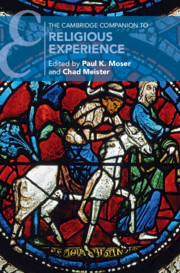Book contents
- The Cambridge Companion to Religious Experience
- Cambridge Companions to Religion
- The Cambridge Companion to Religious Experience
- Copyright page
- Contents
- Figures
- Contributors
- Preface
- Introduction
- Part I Characterizing Religious Experience
- Part II Religious Experience in Traditional Monotheism
- 4 Illumined by Meaning
- 5 Religious Experience in Early Christianity
- 6 Religious Experience in Traditional Islam
- Part III Religious Experience Outside Traditional Monotheism
- Part IV Prominent Themes and Challenges
- Index
- Cambridge Companions to Religion
- References
6 - Religious Experience in Traditional Islam
from Part II - Religious Experience in Traditional Monotheism
Published online by Cambridge University Press: 20 June 2020
- The Cambridge Companion to Religious Experience
- Cambridge Companions to Religion
- The Cambridge Companion to Religious Experience
- Copyright page
- Contents
- Figures
- Contributors
- Preface
- Introduction
- Part I Characterizing Religious Experience
- Part II Religious Experience in Traditional Monotheism
- 4 Illumined by Meaning
- 5 Religious Experience in Early Christianity
- 6 Religious Experience in Traditional Islam
- Part III Religious Experience Outside Traditional Monotheism
- Part IV Prominent Themes and Challenges
- Index
- Cambridge Companions to Religion
- References
Summary
Chittick focuses on Sufism or “Islamic mysticism” as a prominent influence in Islamic history regarding religious experience, noting that its mystical emphasis among Muslims traces back to Mohammad and the Qur’an.He finds that according to the Sufi literature of Ibn Arabi, a soul must be prepared for mystical experience to reap its benefits and to avoid the mistaken assumption that it removes one from the obligation to follow the teachings of the Qur’an.
- Type
- Chapter
- Information
- The Cambridge Companion to Religious Experience , pp. 134 - 156Publisher: Cambridge University PressPrint publication year: 2020

